|
Traditionally, most New York State trout
streams have been stocked by parking the
hatchery truck as close as possible to the
stream, and putting the fish in the stream
using buckets or nets. Some fishermen would
begin fishing immediately after stocking,
others would learn of the 'hot spot,' and the
stocked fish would be rapidly removed. In fact,
a recent study by the DEC found that 75% of stocked
larger (2-year-old) trout were removed from the
streams within two weeks of being stocked, and 90%
were harvested by June.
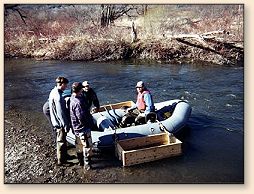
Float stocking consists of floating the hatchery
fish down the stream, and releasing them periodically
all along the stream's entire length. Float stocking
provides more fishing opportunities over a longer
period of time, and over a greater area of stream
than does traditional truck and bucket stocking. Float
stocking by the state is not possible, however, due
to the additional time and expense it involves.
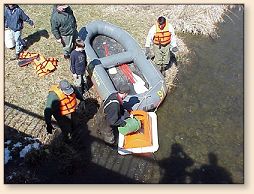 Southern Tier trout streams have been float stocked
by volunteers (including FFF club members Bill
Lavris and Ed Ryan, among others) starting in 1996.
The first equipment used consisted of wooden
rafts with wire mesh bottoms, which were guided
downstream by volunteers wading in the stream
alongside. The initial wooden rafts were constructed
by students in the Conservation Dept. of the
Chemung/Schuyler B.O.C.E.S. under the direction
of Donald McNaughton and Diane Foster. This
system worked, but the uncertain streambottom
led to occasional spills of people, rafts, and
fish. In 1999, volunteers began using rubber rafts
to ferry the wooden float boxes downstream, instead of
walking in the stream next to them. Initially, large
4-person rafts were used, and in time, the wooden
float rafts were replaced with plastic 55 gallon
barrels with a flotation collar. These were an
improvement, but still rather clumsy and unwieldy
to navigate through the stream courses.
Southern Tier trout streams have been float stocked
by volunteers (including FFF club members Bill
Lavris and Ed Ryan, among others) starting in 1996.
The first equipment used consisted of wooden
rafts with wire mesh bottoms, which were guided
downstream by volunteers wading in the stream
alongside. The initial wooden rafts were constructed
by students in the Conservation Dept. of the
Chemung/Schuyler B.O.C.E.S. under the direction
of Donald McNaughton and Diane Foster. This
system worked, but the uncertain streambottom
led to occasional spills of people, rafts, and
fish. In 1999, volunteers began using rubber rafts
to ferry the wooden float boxes downstream, instead of
walking in the stream next to them. Initially, large
4-person rafts were used, and in time, the wooden
float rafts were replaced with plastic 55 gallon
barrels with a flotation collar. These were an
improvement, but still rather clumsy and unwieldy
to navigate through the stream courses.
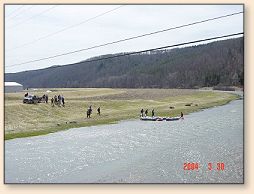
In early 2004, a group of fishermen from the Hornell,
N.Y. area, led by Don Graham, John Arnault, Bob
White, Bud Kintz and Roy Patterson, further improved
the float stocking process by purchasing several
smaller, more manueverable rubber rafts. These
were specially reinforced to withstand the
rough use involved in float stocking. Fish
flotation barrels were given an additional
flotation collar at this time also. The new
rafts carry two to three volunteers, with the
attached fish barrels carrying about 300 fish
each.
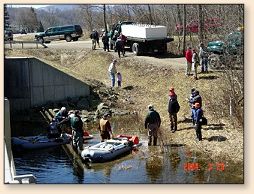 In late March '04, volunteers from the Twin Tiers FFF,
the Conhocton Chapter of Trout Unlimited, and
students from the Wayland-Cohocton Central School
successfully float stocked the Cohocton River
with approximately 4000 trout, from the Village
of Cohocton to Kanona, using the new equipment.
In late March '04, volunteers from the Twin Tiers FFF,
the Conhocton Chapter of Trout Unlimited, and
students from the Wayland-Cohocton Central School
successfully float stocked the Cohocton River
with approximately 4000 trout, from the Village
of Cohocton to Kanona, using the new equipment.
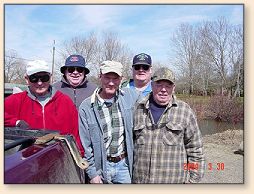
Cayuta Creek was then float stocked using the
same rafts and barrels by members of the FFF and
Catherine's Creek TU. Other TU chapters in the
Southern Tier are now asking to use the equipment
on their streams. The Twin Tiers FFF club assisted
this effort with fund raising, planning, and
publicity, and the Hornell 'float stockers' are now
affiliated with the Twin Tiers FFF chapter.
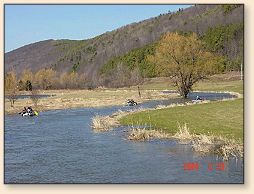 This is a great example of how a few people
volunteering their time, organizing around
a common interest, and supported by established
organizations like the Federation of Fly Fishers,
can have a real impact on the quality of our
local fishing.
This is a great example of how a few people
volunteering their time, organizing around
a common interest, and supported by established
organizations like the Federation of Fly Fishers,
can have a real impact on the quality of our
local fishing.
For more information on the float stocking equipment
and operation, contact:
Hornell NY area: Don Graham, 607-324-6445
or
Elmira NY area: Bill Lavris, 607-732-4615,
lavrisb@earthlink.net
~ John Lively
Publisher's Note: Our sincere thanks to the Twin Tiers-Five
Rivers Chapter for sharing this with our readers. We hope it will
inspire more groups to use this very effective way of stocking!
|


 Southern Tier trout streams have been float stocked
by volunteers (including FFF club members Bill
Lavris and Ed Ryan, among others) starting in 1996.
The first equipment used consisted of wooden
rafts with wire mesh bottoms, which were guided
downstream by volunteers wading in the stream
alongside. The initial wooden rafts were constructed
by students in the Conservation Dept. of the
Chemung/Schuyler B.O.C.E.S. under the direction
of Donald McNaughton and Diane Foster. This
system worked, but the uncertain streambottom
led to occasional spills of people, rafts, and
fish. In 1999, volunteers began using rubber rafts
to ferry the wooden float boxes downstream, instead of
walking in the stream next to them. Initially, large
4-person rafts were used, and in time, the wooden
float rafts were replaced with plastic 55 gallon
barrels with a flotation collar. These were an
improvement, but still rather clumsy and unwieldy
to navigate through the stream courses.
Southern Tier trout streams have been float stocked
by volunteers (including FFF club members Bill
Lavris and Ed Ryan, among others) starting in 1996.
The first equipment used consisted of wooden
rafts with wire mesh bottoms, which were guided
downstream by volunteers wading in the stream
alongside. The initial wooden rafts were constructed
by students in the Conservation Dept. of the
Chemung/Schuyler B.O.C.E.S. under the direction
of Donald McNaughton and Diane Foster. This
system worked, but the uncertain streambottom
led to occasional spills of people, rafts, and
fish. In 1999, volunteers began using rubber rafts
to ferry the wooden float boxes downstream, instead of
walking in the stream next to them. Initially, large
4-person rafts were used, and in time, the wooden
float rafts were replaced with plastic 55 gallon
barrels with a flotation collar. These were an
improvement, but still rather clumsy and unwieldy
to navigate through the stream courses.
 In late March '04, volunteers from the Twin Tiers FFF,
the Conhocton Chapter of Trout Unlimited, and
students from the Wayland-Cohocton Central School
successfully float stocked the Cohocton River
with approximately 4000 trout, from the Village
of Cohocton to Kanona, using the new equipment.
In late March '04, volunteers from the Twin Tiers FFF,
the Conhocton Chapter of Trout Unlimited, and
students from the Wayland-Cohocton Central School
successfully float stocked the Cohocton River
with approximately 4000 trout, from the Village
of Cohocton to Kanona, using the new equipment.
 This is a great example of how a few people
volunteering their time, organizing around
a common interest, and supported by established
organizations like the Federation of Fly Fishers,
can have a real impact on the quality of our
local fishing.
This is a great example of how a few people
volunteering their time, organizing around
a common interest, and supported by established
organizations like the Federation of Fly Fishers,
can have a real impact on the quality of our
local fishing.